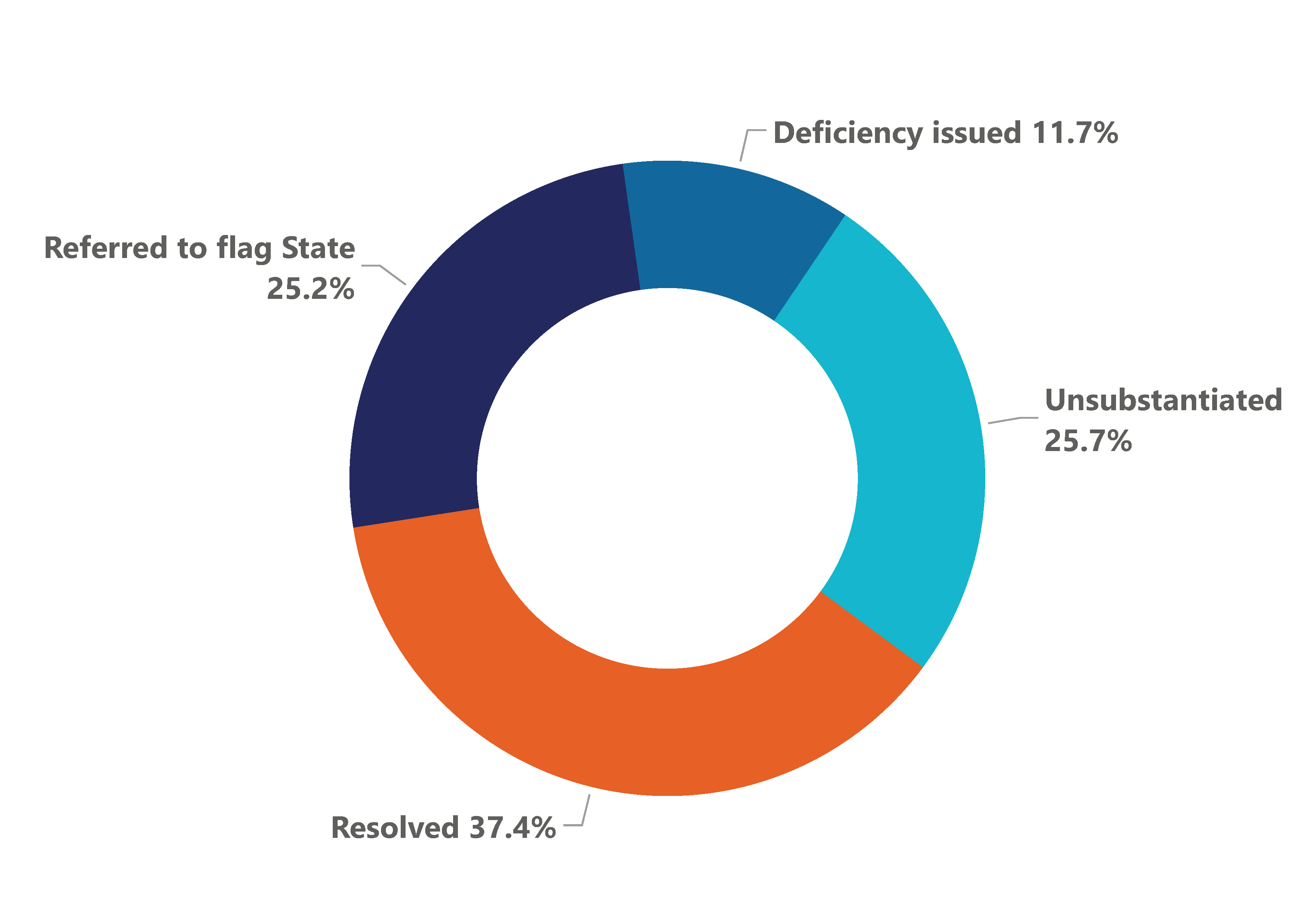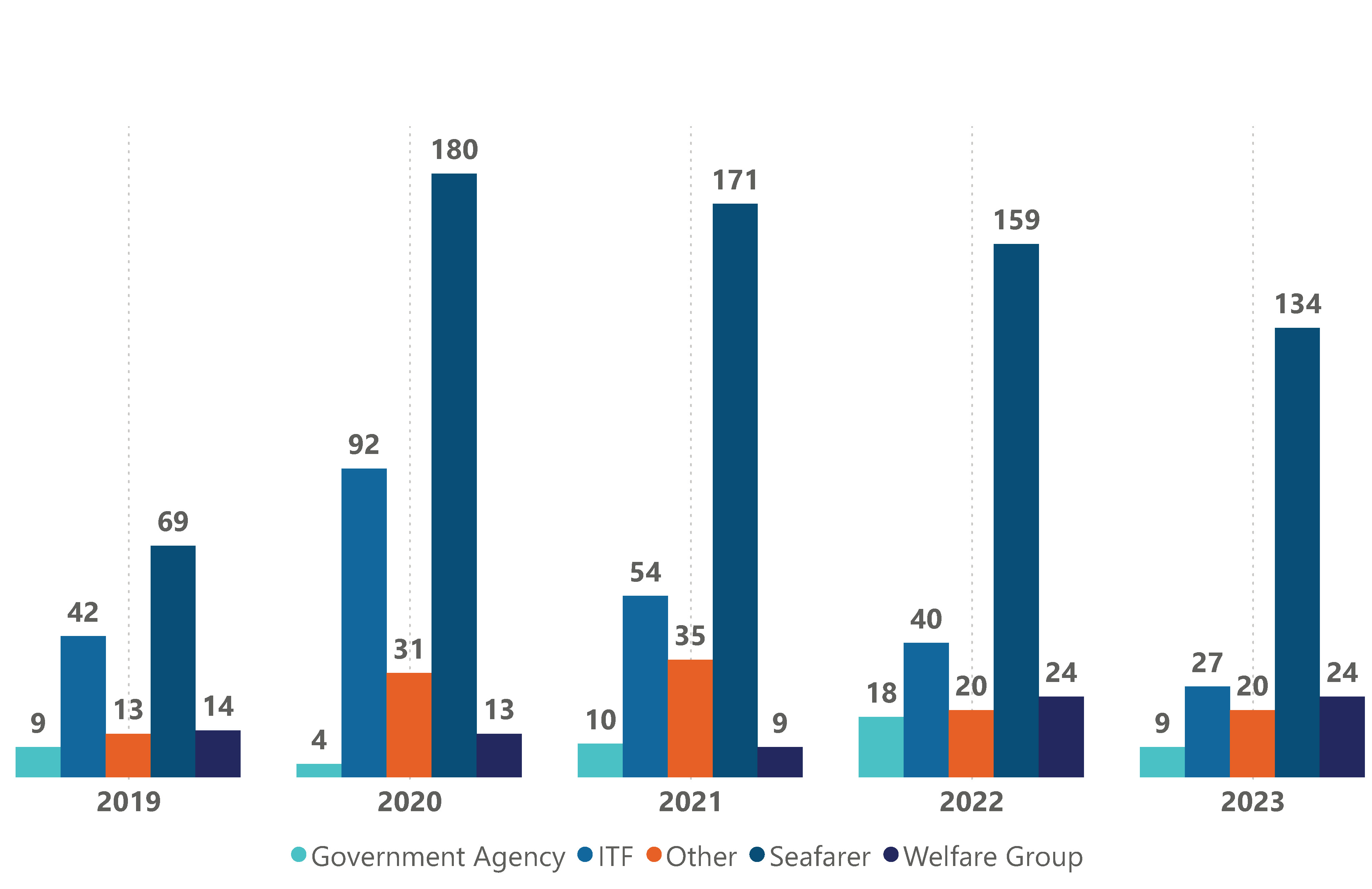MLC complaints received
The MLC requires all vessels to establish an onboard complaints procedure that provides seafarers with the opportunity to make complaints without concern or repercussion. The MLC also has provisions which gives rights to seafarers to make a complaint to the relevant flag or port State authorities when they believe that their living and/or working conditions on board are below standard.
AMSA received and processed a total of 1935 complaints since the implementation of the MLC (August 2013).
In 2023, AMSA received 214 complaints1 representing an 18% decrease on the number received in 2022 (261). The number of complaints has continued to decline from the peak of 320 in 2020. The reduced frequency of complaints is indicative of industry and operators continued adjustment following the COVID-19 pandemic peak but is still higher than pre-Covid levels.
Figure 1 MLC complaints received by year
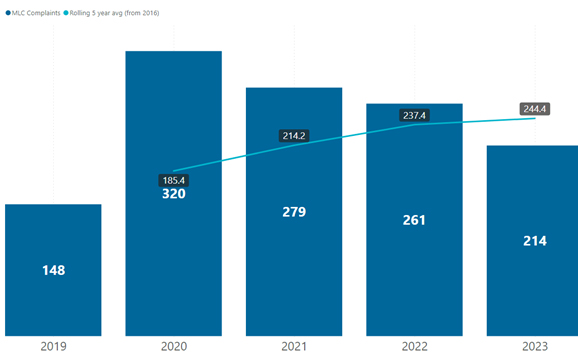
Follow up to complaints received
When complaints are received by AMSA, all necessary actions are taken to ensure the confidentiality of the seafarer making the complaint. Where appropriate, AMSA encourages resolution of complaints at shipboard level, and if this is not possible, at the flag State level. If a complaint can’t be resolved, AMSA will follow-up and may issue deficiencies or detain the vessel.
AMSA may refuse vessels access to Australia where there are significant concerns about the performance of vessels and they pose an increased risk to seafarers, other vessels and the marine environment. AMSA has a zero-tolerance approach to breaches under the MLC and has issued direction notices refusing vessels access to Australian ports for systemic non-compliance with the MLC (Refusal of access list and letters of warning list).
Since 2018, a total of 25 vessels have been issued with a direction notice refusing them access to Australian ports. Of these vessels, 14 were banned for serious breaches of the MLC primarily relating to underpayment of wages, decent working and living conditions and inadequate provisions. Over $95,000 USD was recovered from vessels in 2023. In 2023, one vessel2 was banned from Australian ports due to MLC breaches. The reasons for the ban included systemic underpayment of wages and seafarers being coerced into signing new employment agreements. The vessel was banned for a period of 12 months.
In 2023, follow up investigations of MLC complaints resulted in 24 vessels receiving MLC-related deficiencies, five of which were detained3 .
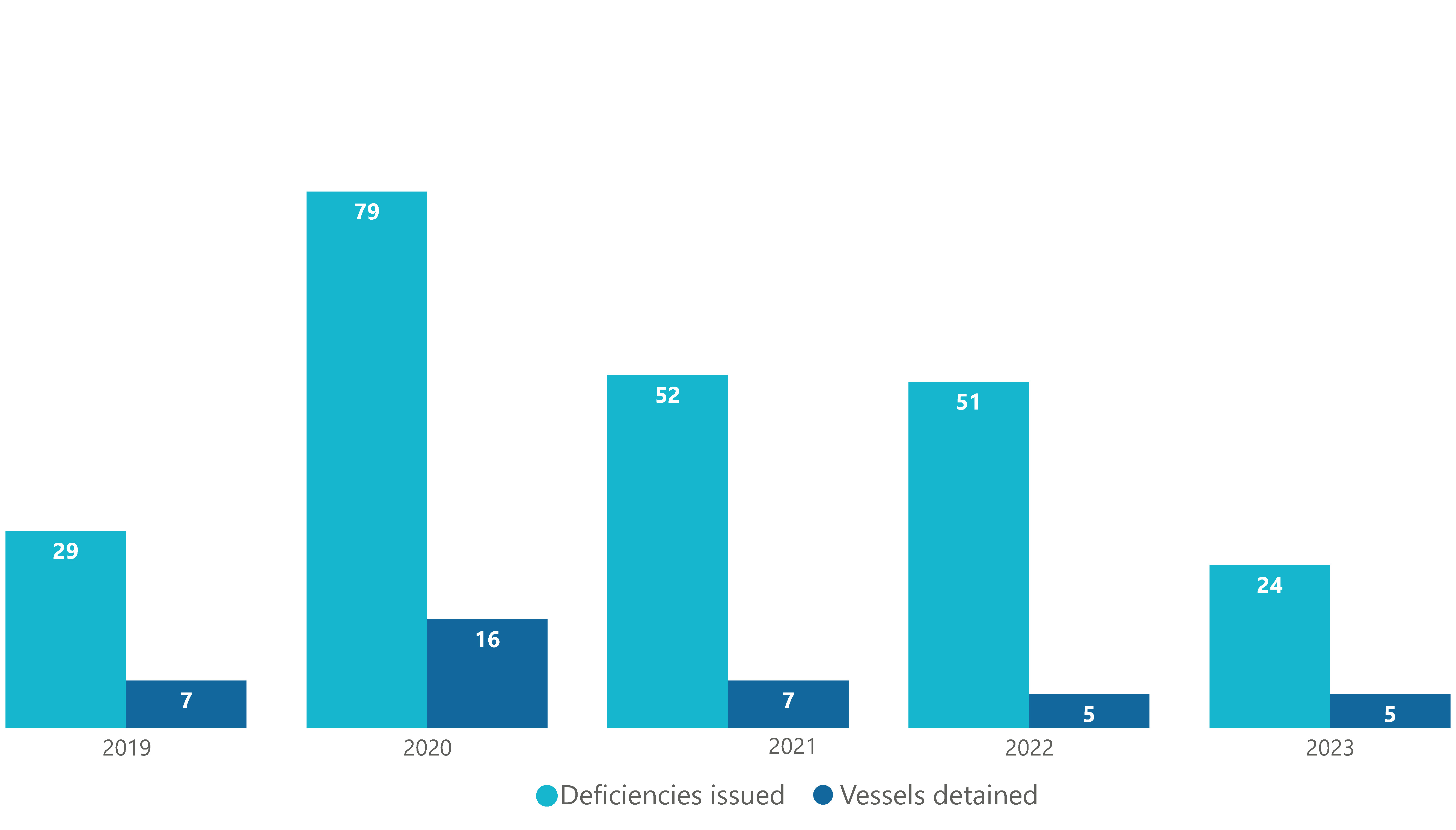
Figure 2 Number of MLC complaints resulting in the deficiency or vessel detention between 2019-2023
Breakdown of complaints by vessel type
In 2023, 58.9% of complaints received were from seafarers engaged on bulk carriers. This is a 3.6% reduction from the 2022 complaints. Bulk carriers accounted for 50.4% of all arrivals and 51.6% of initial port State control (PSC) inspections4 .

Figure 3 Breakdown of complaints by vessel type for 2023
Table 2 Percentage of MLC complaints by vessel type as a proportion of the unique arrivals for each vessel type.
| Vessel type | 2019 | 2020 | 2021 | 2022 | 2023 |
|---|---|---|---|---|---|
| Bulk carrier | 2.2% | 5.4% | 4.5% | 4.1% | 3.1% |
| Chemical tanker | 0.8% | 3% | 5.3% | 2.3% | 2.8% |
| Container ship | 3.2% | 13% | 6.5% | 9.2% | 7.8% |
| Gas carrier | 2.3% | 4.9% | 4.6% | 3.5% | 2% |
| General cargo/multi-purpose | 1.6% | 3.6% | 4.9% | 4.5% | 3.6% |
| Livestock carrier | 12.9% | 12.5% | 14.8% | 4.2% | 0 |
| Oil tanker | 2.2% | 2.8% | 2.3% | 4.2% | 3.2% |
| Vehicle carrier | 1.9% | 1.6% | 1.4% | 1.7% | 3% |
| Other | 5.5% | 2.5% | 4.5% | 5.3% | 4.6% |
Breakdown of complaints by State
Figure 4 shows complains received broken down by the Australian state or territory in which the vessel arrived in 2023. Western Australia (35%) and Queensland (25.2%t) represented the highest number of complaints. Western Australia (34.3%) and Queensland (25.9%) continue to represent the majority of vessel arrivals in Australia in 2023.
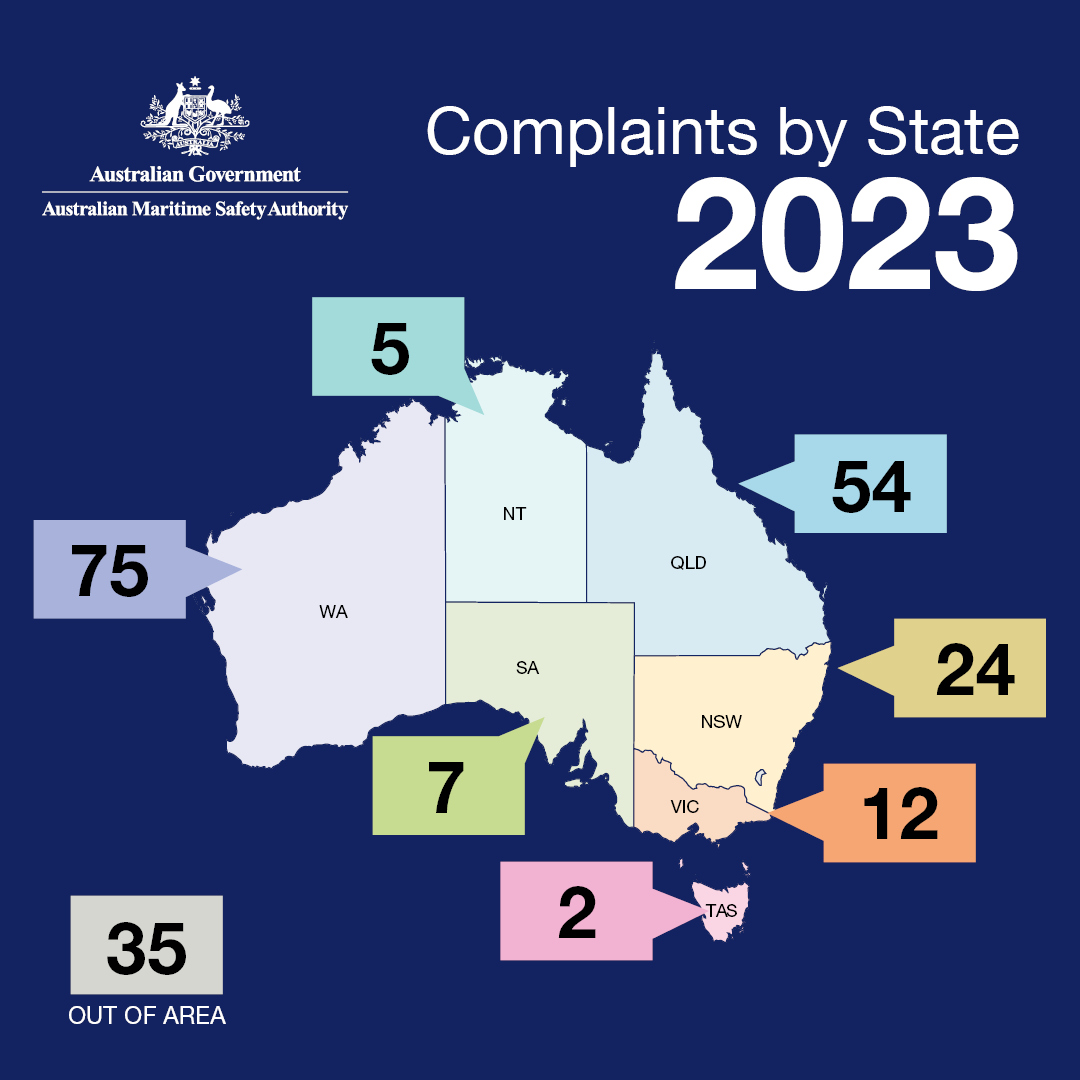
| State | Number |
|---|---|
| NT | 5 |
| TAS | 2 |
| SA | 7 |
| VIC | 12 |
| NSW | 24 |
| Out of Area (Outside EEZ) | 35 |
| Qld | 54 |
| WA | 75 |
Figure 4 Number of complaints received by State for 2023
Complaints received by MLC titles
The main body of the MLC (the regulations and the code) is grouped into five main titles
with data coded accordingly.
Title 1 – Minimum requirements for seafarers to work on vessels
Title 2 – Conditions of employment
Title 3 – Accommodation, recreational facilities, food and catering
Title 4 – Health Protection, medical care, welfare, and social security protection (including bullying and harassment)
Title 5 – Compliance and enforcement
Complaints on Title 2 of the MLC - Conditions of employmentcontinue to make up the majority of MLC complaints received as per Table 3. This includes seafarer employment agreements (SEAs), wages, hours of work and rest, entitlement to leave, repatriation, and crewing5 levels. This is followed by title 4 - Health Protection, medical care, welfare, and social security protection (including bullying and harassment) which remains consistent across the years.AMSA will continue to monitor these trends and ensure compliance with MLC is upheld by vessels coming into Australian waters.
Table 3 MLC complaints breakdown by title6 2019-2023
| MLC Title | 2019 | 2020 | 2021 | 2022 | 2023 |
|---|---|---|---|---|---|
| Title 1 Minimum requirements | 3 | 1 | 1 | 2 | 0 |
| Title 2 Conditions of employment | 124 | 480 | 292 | 234 | 169 |
| Title 3 Accommodation, recreational facilities, food and catering | 39 | 47 | 51 | 68 | 60 |
| Title 4 Health protection, medical care, welfare, social security protection | 55 | 73 | 88 | 100 | 81 |
| Table 5 Compliance and enforcement | 0 | 1 | 0 | 7 | 4 |
Conditions of employment (Title 2)
Table 4 Title 2 complaints for 2019-2023
| MLC Regulation (Title 2) | 2019 | 2020 | 2021 | 2022 | 2023 |
|---|---|---|---|---|---|
| 2.1 Seafarers’ employment agreements | 17 | 194 | 83 | 41 | 28 |
| 2.2 Wages | 65 | 53 | 71 | 58 | 42 |
| 2.3 Hours of work and hours of rest | 29 | 29 | 32 | 37 | 45 |
| 2.4 Entitlement to leave | 3 | 1 | 0 | 39 | 31 |
| 2.5 Repatriation | 7 | 197 | 104 | 56 | 23 |
| 2.7 Crewing levels | 3 | 6 | 2 | 3 | 0 |
The proportion of Title 2 complaints in relation to all other complaints decreased slightly from 56.9% in 2022 to 53.8% in 2023. Complaints received regarding seafarer employment agreements continues to decrease from 41 in 2022 to 28 in 2023 as per Table 4. Similarly, repatriation-related Title 2 complaints decreased from 56 in 2022 to 23 in 2023 (Table 4). This is an indication that AMSA’s response to repatriation complaints is effective, and industry and operators are better equipped to manage the repatriation of seafarers.
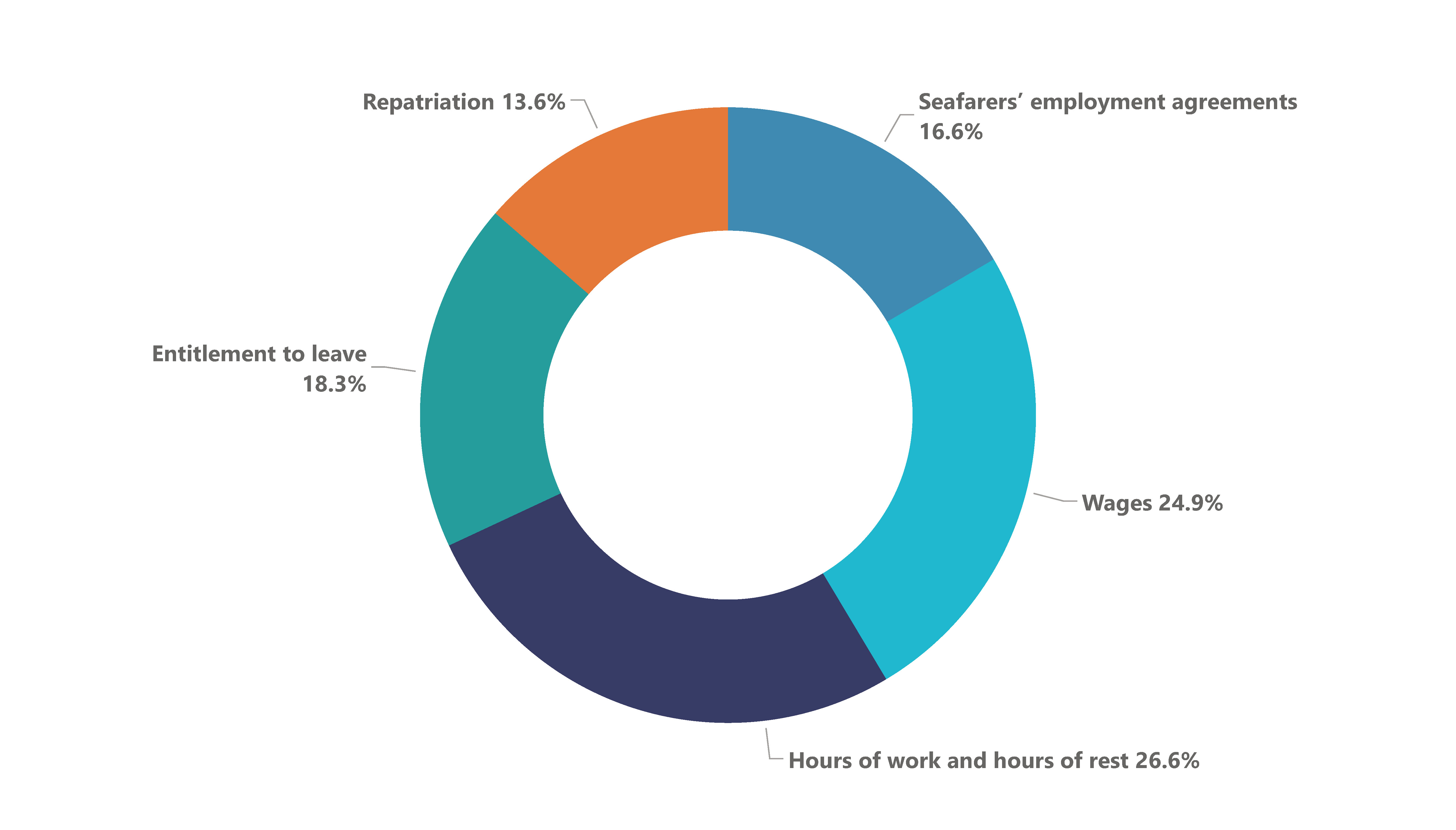
Figure 5 Title 2 by percentage of regulation for 2023
Health protection, medical care, welfare, social security protection (Title 4)
Table 5 Title 4 complaints for 2019-2023
| MLC Regulation | 2019 | 2020 | 2021 | 2022 | 2023 |
|---|---|---|---|---|---|
| 4.1 Medical care on board ship and ashore | 5 | 29 | 29 | 25 | 12 |
| 4.2 Shipowners' liability | 0 | 0 | 1 | 1 | 1 |
| 4.3 Health and safety protection and accident protection | 36 | 42 | 54 | 72 | 63 |
| 4.4 Access to shore-based welfare facilities | 4 | 2 | 1 | 1 | 5 |
| 4.5 Social Security | 0 | 0 | 0 | 1 | 0 |
In 2023, most of the complaints (77.8%) received for Title 4 were regarding concerns with health and safety protection and accident protection. The marine notice on access to shore leave for seafarers was republished to highlight the importance of granting shore leave to seafarers and the benefits to seafarer wellbeing and recovery associated with shore leave.
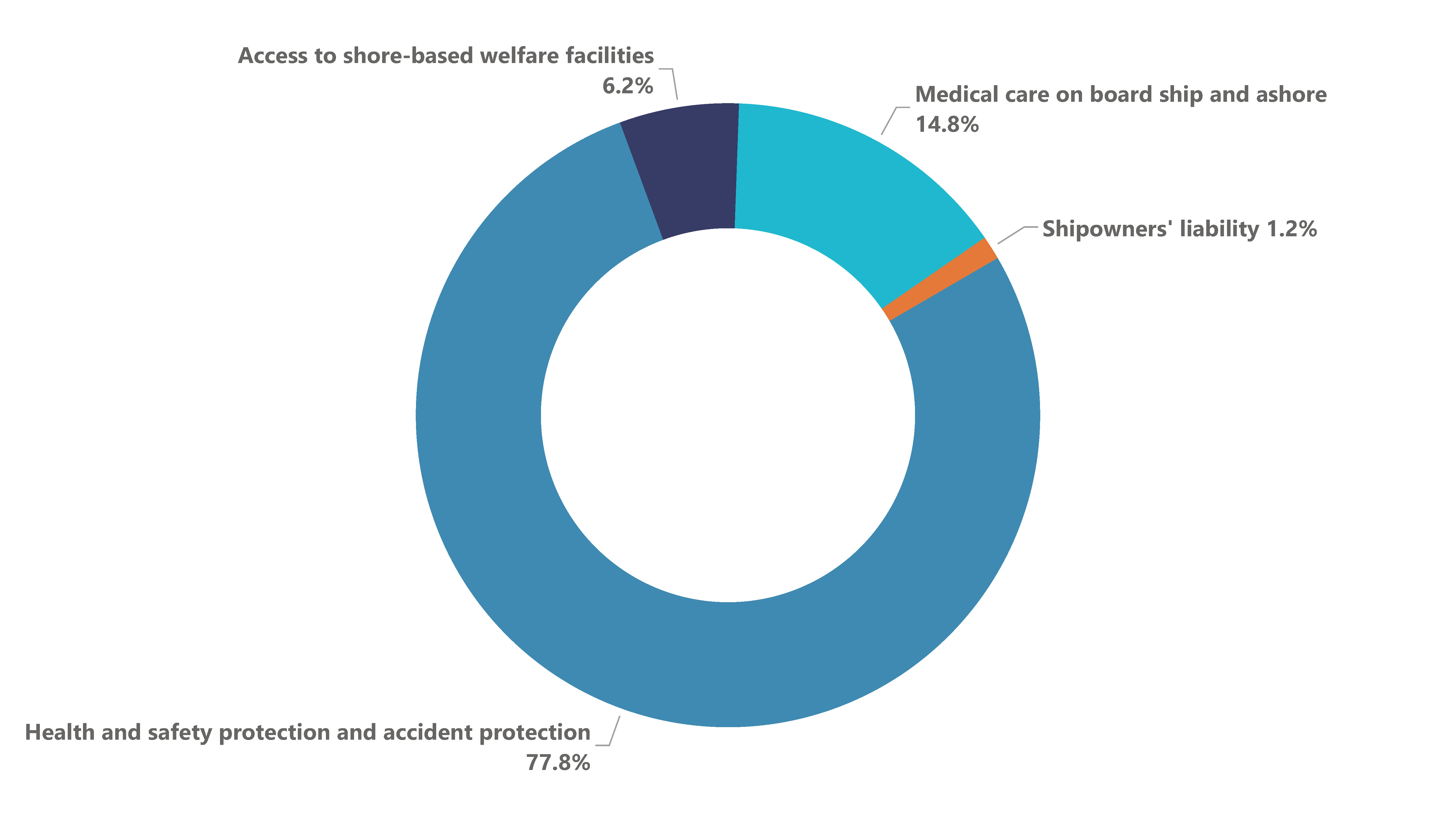
Figure 6 Title 4 by percentage of regulation for 2023
Breakdown of complaints by outcome
AMSA endeavours to follow-up on all reported MLC complaints —and has done so—except in cases where the vessel is outside of Australian waters and not bound for an Australian port and therefore beyond the regulatory oversight of AMSA. In those situations, AMSA refer the complaint to the flag State of the vessel and/or the next port State. AMSA may also place alerts on the vessel to ensure the complaint is followed-up when it next arrives in Australia. In all cases we try to ensure that the confidentiality of the complainant is maintained. Where AMSA refers information to the flag State or next port State, we expect that similar steps are taken to ensure the confidentiality of the complainant.
Figure 7 provides a breakdown of the follow up actions undertaken. The figures remain consistent, with a slight increase in complaints originating from foreign vessels that are not in Australian waters or on a voyage to Australia. This is likely due to the reputation Australia has regarding seafarer welfare.
Figure 7 Breakdown of complaints by outcomes for 2023
Breakdown of complaints received by flag State
Figure 8 shows the distribution of complaints received from foreign flagged vessels by flag State for 2023. Figure 9 shows the distribution of complaints when the number of port arrivals is taken into consideration7 .
The flag States in Figure 8 and 9 accounted for 73% of foreign flagged port arrivals in Australia and represented 87% of complaints received from foreign flagged vessels in 2023.
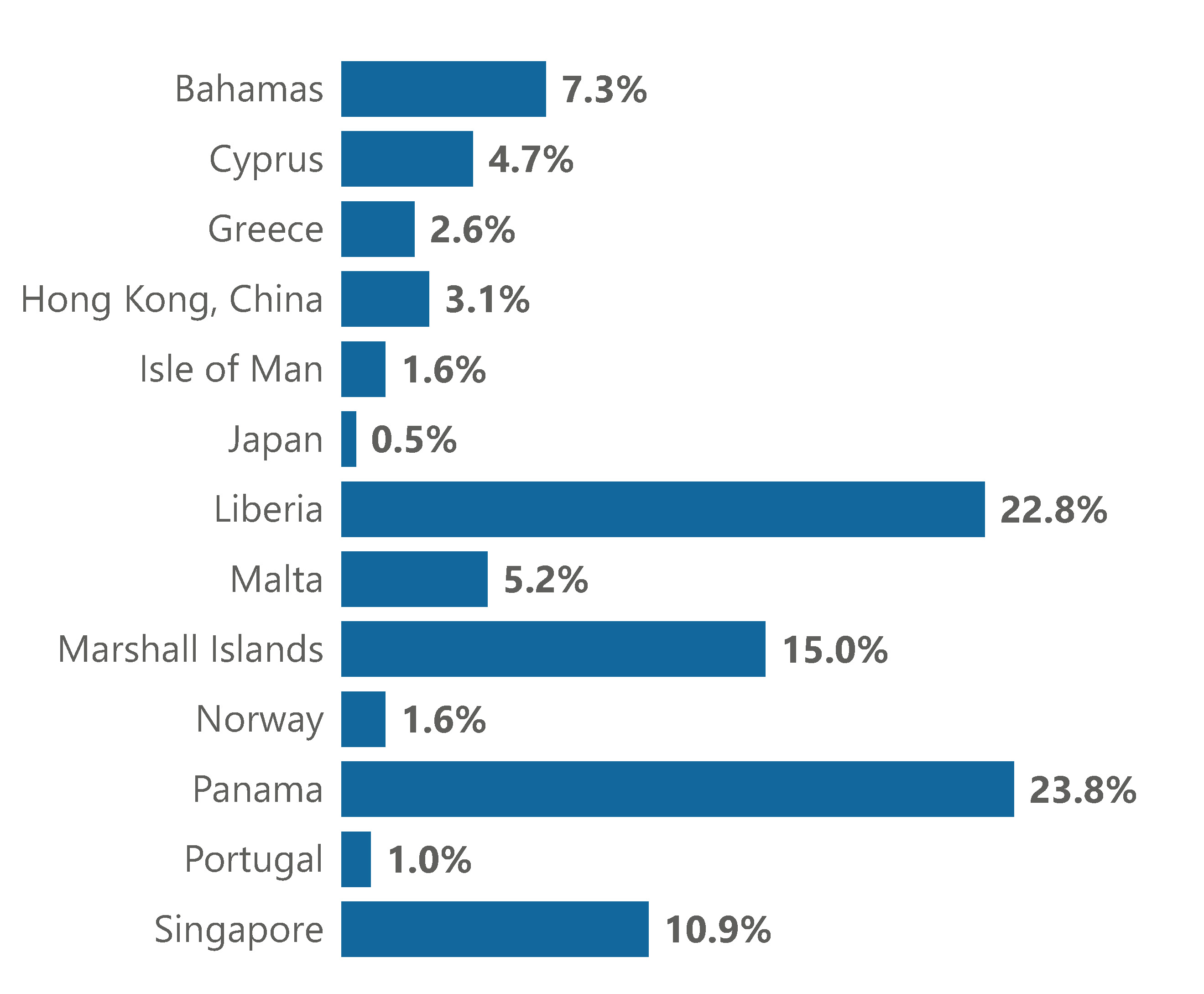
Figure 8: Data showing percent of complaints received by flag State for 2023
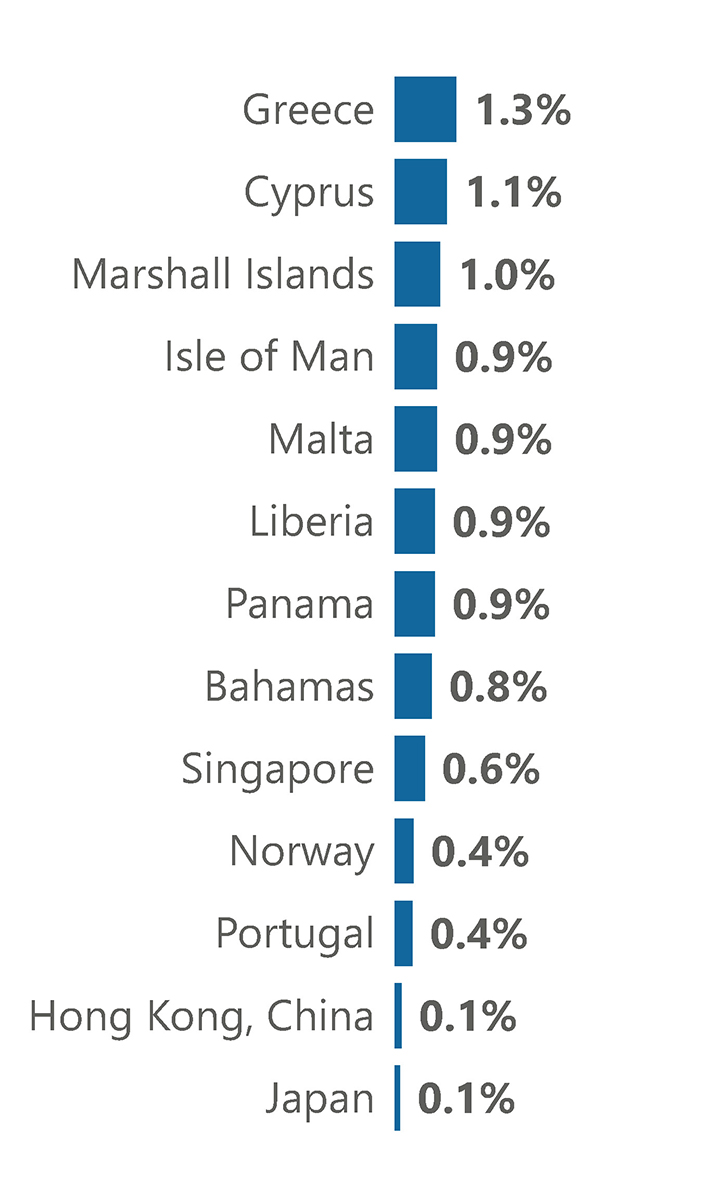
Figure 9: Data showing percent of complaints received as a proportion to port arrivals for each flag State for 2023
Source of complaints
Most of the complaints originated directly from seafarers. This is consistent with previous years. This is likely an indication of the increased awareness of seafarers’ rights under the MLC and the reputation Australia has on MLC matters. Seafarers are therefore more confident that their concerns are taken seriously and treated confidentially when in Australia.
Table 6 Source of complaints 2019-2023
| Source | 2019 | 2020 | 2021 | 2022 | 2023 |
|---|---|---|---|---|---|
| Seafarer | 69 | 180 | 171 | 159 | 135 |
| ITF | 42 | 92 | 54 | 40 | 26 |
| Welfare group | 13 | 13 | 9 | 24 | 24 |
| Government agency | 9 | 4 | 10 | 18 | 9 |
| Other 8 | 13 | 31 | 35 | 20 | 20 |
Figure 10 Breakdown of the source of the complaints 2019-2023
Footnotes
1 2023 data includes one complaint received from one regulated Australian vessel (RAV). The complaint received was under MLC Title 3: Accommodation and recreational facilities, food and catering.
2 Further information about the ban is available on the AMSA website.
3 Seven vessels were detained during a follow-up inspection for deficiencies other than MLC.
4 Further information on AMSA’s PSC activities is available in the 2023 AMSA Annual Inspections report.
5 Derivations of the word 'crewing' are used by AMSA interchangeably with derivations of the word 'manning', as in IMO, ILO, Australian legislation, and other relevant documents.
6 An MLC complaint can include more than 1 concern, therefore more than 1 MLC Title can be assigned to the complaint.
7 Normalising the data by port arrivals provides for a better reflection of the complaint rate of vessels from different flag States.
8 ‘Other’ includes complaints received from family or friends of affected seafarers.
